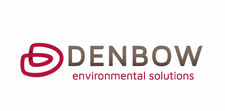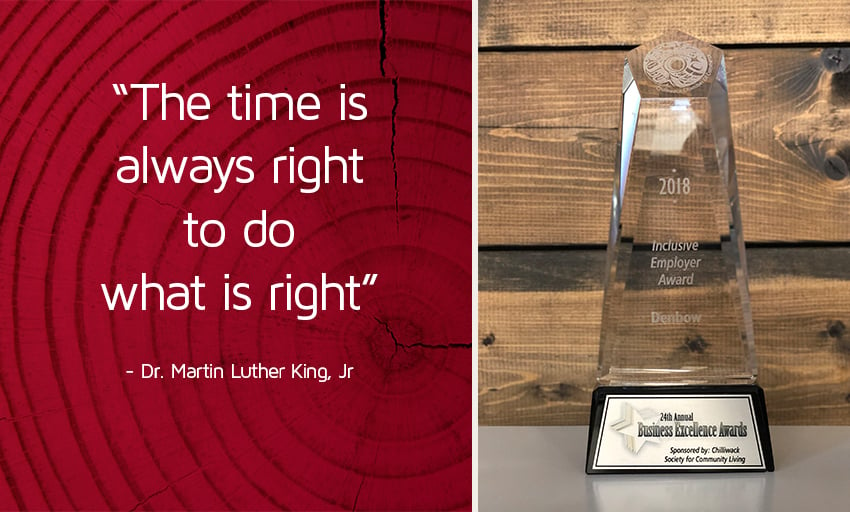The Canadian Nursery Landscape Association has done an in-depth analysis on the life cycle cost of natural stormwater management methods. They looked at projects with these specific methods:
- Bioretention
- Enhanced Grass Swale
- Permeable Interlocking Concrete Pavers
- Rainwater Harvesting
- Naturalized Stormwater Pond
"Life Cycle Cost Analysis of Natural On-site Stormwater Management Methods"
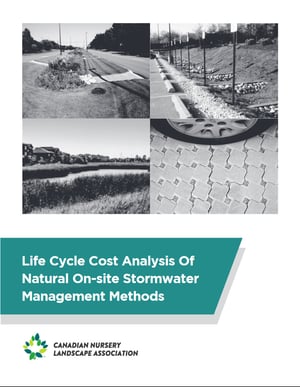 Increased development is creating greater impervious areas in the built environment, causing stormwater runoff volumes to rise and add to the workload of municipal waste water treatment plants. Treating, pumping and distributing water uses a large amount of energy, resulting in greenhouse gas emissions and increased carbon footprints. The landscape horticulture industry is in a unique position to provide alternative solutions to traditional stormwater management techniques by reducing the runoff at the source and therefore reducing the environmental impacts of stormwater treatment.
Increased development is creating greater impervious areas in the built environment, causing stormwater runoff volumes to rise and add to the workload of municipal waste water treatment plants. Treating, pumping and distributing water uses a large amount of energy, resulting in greenhouse gas emissions and increased carbon footprints. The landscape horticulture industry is in a unique position to provide alternative solutions to traditional stormwater management techniques by reducing the runoff at the source and therefore reducing the environmental impacts of stormwater treatment.This paper applies the Life Cycle Cost Analysis (LCCA) method to five scenarios to determine their economic performance compared to traditional strategies. In almost every case these sustainable, low impact designs were cost effective over the life of the project compared to traditional “pave and convey-away” methods while also providing additional environmental and social benefits. Average annual maintenance costs were consistently lower than the traditional techniques, which often required significant material removal as part of their rehabilitation unlike the more durable natural designs.
It is clear that on-site stormwater management methods are viable strategies that add to the sustainability of our built environment. The planning and expertise from a variety of professions working together are essential to achieve success with these stormwater management methods - each site has its own characteristics that can be developed into cost effective and sustainable landscape solutions.
Life Cycle Cost Analysis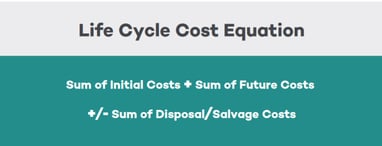

Life Cycle Cost Analysis (LCCA) is a method used to assess the total cost of ownership for a project, or elements of a project. LCCA takes all the economic impacts of design alternatives into consideration and creates an apples-to-apples comparison of the choices
LCCA is most effective when used early in the design phase of a project, as it enables decision-makers to select products/solutions that are based on the long-term economic analysis of each, and not simply the first cost. By com-
paring product LCCA results, trade-off can be made between high initial cost items and long-term operating costs/savings.
LCCA has gained popularity in recent years as an economic management tool. The LCCA method provides a standardized assessment approach that helps remove divisional conflicts within organizations, by accounting for all
associated costs and benefits. The result is a robust economic comparison of product alternatives over time, and an improved understanding of how periodic costs impact the total cost of ownership. It should be noted that LCCA is flexible by design and allows for the incorporation of any unique periodic, or reoccurring costs that might be incurred over the economic evaluation period.
This is especially relevant to stormwater infrastructure due to the ongoing maintenance and repair costs required to maintain the structures over long lifetimes.
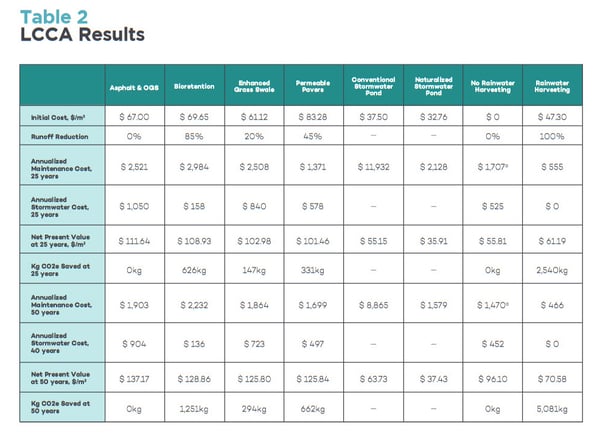
Read the full analysis here: https://cnla.ca/uploads/pdf/LCCA-Stormwater-Report.pdf
